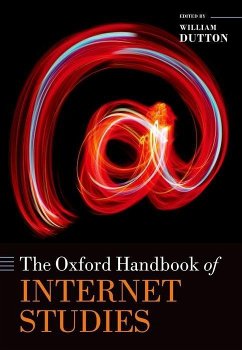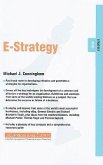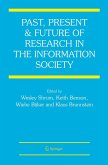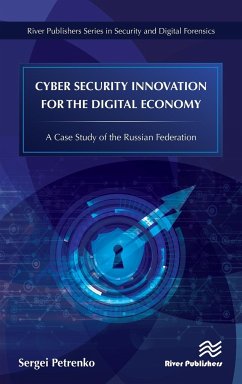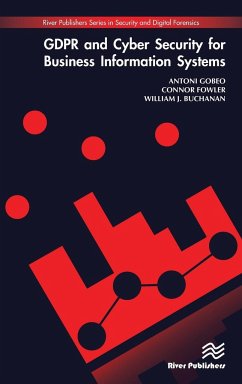William H Dutton
Oxford Handbook of Internet Studies
William H Dutton
Oxford Handbook of Internet Studies
- Gebundenes Buch
- Merkliste
- Auf die Merkliste
- Bewerten Bewerten
- Teilen
- Produkt teilen
- Produkterinnerung
- Produkterinnerung
The Handbook is a landmark in the dynamic and rapidly expanding field of Internet Studies, bringing together leading international scholars to strengthen research on how the Internet has been studied and the discipline's fundamental questions, and shape research, policy, and practice for the future.
Andere Kunden interessierten sich auch für
![Wiley Pathways E-Business Wiley Pathways E-Business]() Greg HoldenWiley Pathways E-Business91,99 €
Greg HoldenWiley Pathways E-Business91,99 €![E-Strategy E-Strategy]() Michael J CunninghamE-Strategy22,99 €
Michael J CunninghamE-Strategy22,99 €![Enabling Ebusiness Enabling Ebusiness]() W. S. WhyteEnabling Ebusiness158,99 €
W. S. WhyteEnabling Ebusiness158,99 €![A Manager's Primer on E-Networking A Manager's Primer on E-Networking]() Dragan NikolikA Manager's Primer on E-Networking60,99 €
Dragan NikolikA Manager's Primer on E-Networking60,99 €![Past, Present and Future of Research in the Information Society Past, Present and Future of Research in the Information Society]() Past, Present and Future of Research in the Information Society106,99 €
Past, Present and Future of Research in the Information Society106,99 €![Cyber Security Innovation for the Digital Economy Cyber Security Innovation for the Digital Economy]() Sergei PetrenkoCyber Security Innovation for the Digital Economy131,99 €
Sergei PetrenkoCyber Security Innovation for the Digital Economy131,99 €![GDPR and Cyber Security for Business Information Systems GDPR and Cyber Security for Business Information Systems]() Antoni GobeoGDPR and Cyber Security for Business Information Systems92,99 €
Antoni GobeoGDPR and Cyber Security for Business Information Systems92,99 €-
-
-
The Handbook is a landmark in the dynamic and rapidly expanding field of Internet Studies, bringing together leading international scholars to strengthen research on how the Internet has been studied and the discipline's fundamental questions, and shape research, policy, and practice for the future.
Hinweis: Dieser Artikel kann nur an eine deutsche Lieferadresse ausgeliefert werden.
Hinweis: Dieser Artikel kann nur an eine deutsche Lieferadresse ausgeliefert werden.
Produktdetails
- Produktdetails
- Verlag: Oxford University Press (UK)
- Seitenzahl: 628
- Erscheinungstermin: 1. März 2013
- Englisch
- Abmessung: 246mm x 173mm x 48mm
- Gewicht: 1256g
- ISBN-13: 9780199589074
- ISBN-10: 0199589070
- Artikelnr.: 47975638
- Herstellerkennzeichnung
- Libri GmbH
- Europaallee 1
- 36244 Bad Hersfeld
- gpsr@libri.de
- Verlag: Oxford University Press (UK)
- Seitenzahl: 628
- Erscheinungstermin: 1. März 2013
- Englisch
- Abmessung: 246mm x 173mm x 48mm
- Gewicht: 1256g
- ISBN-13: 9780199589074
- ISBN-10: 0199589070
- Artikelnr.: 47975638
- Herstellerkennzeichnung
- Libri GmbH
- Europaallee 1
- 36244 Bad Hersfeld
- gpsr@libri.de
William H. Dutton is Professor of Internet Studies at the Oxford Internet Institute, University of Oxford, and Fellow of Balliol College. Before coming to Oxford in 2002, Bill was a Professor in the Annenberg School for Communication at the University of Southern California, where he continues an affiliation as Emeritus Professor. In the UK, Bill was a Fulbright Scholar, then National Director of the UK's Programme on Information and Communication Technologies (PICT), and founding director of the OII during its first decade (2002-2011), for which he was awarded a lifetime achievement award. He has authored or edited a number of influential books on the social dynamics of the Internet and related information and communication technologies, including Society on the Line (OUP 1999).
* 1: William H. Dutton: Internet Studies
* Part I. Perspectives on the Internet and Web as Objects of Study
* 2: Martin C. J. Elton and John Carey: The Prehistory of the Internet
and Its Traces in the Present: Implications for Defining the Field
* 3: Kieron O Hara and Wendy Hall: Web Science
* 4: Michael Thelwall: Society on the Web
* 5: Christian Sandvig: The Internet as an Infrastructure
* Part II. Living in a Network Society
* 6: Jack Linchuan Qiu: Network Societies and Internet Studies:
Rethinking Time, Space, and Class
* 7: Eszter Hargittai and Yuli Patrick Hsieh: Digital Inequality
* 8: Nicole B. Ellison and danah m. boyd: Sociality through Social
Network Sites
* 9: Barrie Gunter: The Study of Online Relationships and Dating
* 10: Dmitri Williams and Adam S. Kahn: Games, Online and Off
* 11: Gustavo Cardozo, Guo Liang, and Tiago Lapa: Cross-National
Comparative Perspectives from the World Internet Project
* Part III. Creating and Working in a Global Network Economy
* 12: Michael A. Cusumano and Andreas Goeldi: New Businesses and New
Business Models
* 13: Regina Connolly: Trust in Commercial and Personal Transactions in
the Digital Age
* 14: Paul Henman: Government and the Internet e-Government
* 15: Eric T. Meyer and Ralph Schroeder: Digital Transformations of
Scholarship and Knowledge
* 16: Chris Davies and Rebecca Eynon: Studies of the Internet in
Learning and Education: Broadening the Disciplinary Landscape of
Research
* Part IV. Communication, Power, and Influence in a Converging Media
World
* 17: Ronald E. Rice and Ryan Fuller: Theoretical Perspectives in the
Study of Communication and the Internet
* 18: Eugenia Mitchelstein and Pablo J. Boczkowski: Tradition and
Transformation in Online News Production and Consumption
* 19: Darren G. Lilleker and Thierry Vedel: The Internet in Campaigns
and Elections
* 20: Helen Margetts: Democracy and the Internet
* Part V. Governing and Regulating the Internet
* 21: Victoria Nash: Analysing Freedom of Expression Online:
Theoretical, Empirical, and Normative Contributions
* 22: Matthew David: File-Sharing and Beyond: Cultural, Legal,
Technical and Economic Perspectives on the Future of Copyright Online
* 23: Colin J. Bennett and Christopher Parsons: Privacy and
Surveillance: The Multi-Disciplinary Literature on the Capture, Use,
and Disclosure of Personal information in Cyberspace
* 24: Robin Mansell and W. Edward Steinmueller: Digital
Infrastructures, Economies, and Public Policies: Contending
Rationales and Outcome Assessment Strategies
* 25: Tim Unwin: The Internet and Development
* 26: Laura DeNardis: The Emerging Field of Internet Governance
* Part I. Perspectives on the Internet and Web as Objects of Study
* 2: Martin C. J. Elton and John Carey: The Prehistory of the Internet
and Its Traces in the Present: Implications for Defining the Field
* 3: Kieron O Hara and Wendy Hall: Web Science
* 4: Michael Thelwall: Society on the Web
* 5: Christian Sandvig: The Internet as an Infrastructure
* Part II. Living in a Network Society
* 6: Jack Linchuan Qiu: Network Societies and Internet Studies:
Rethinking Time, Space, and Class
* 7: Eszter Hargittai and Yuli Patrick Hsieh: Digital Inequality
* 8: Nicole B. Ellison and danah m. boyd: Sociality through Social
Network Sites
* 9: Barrie Gunter: The Study of Online Relationships and Dating
* 10: Dmitri Williams and Adam S. Kahn: Games, Online and Off
* 11: Gustavo Cardozo, Guo Liang, and Tiago Lapa: Cross-National
Comparative Perspectives from the World Internet Project
* Part III. Creating and Working in a Global Network Economy
* 12: Michael A. Cusumano and Andreas Goeldi: New Businesses and New
Business Models
* 13: Regina Connolly: Trust in Commercial and Personal Transactions in
the Digital Age
* 14: Paul Henman: Government and the Internet e-Government
* 15: Eric T. Meyer and Ralph Schroeder: Digital Transformations of
Scholarship and Knowledge
* 16: Chris Davies and Rebecca Eynon: Studies of the Internet in
Learning and Education: Broadening the Disciplinary Landscape of
Research
* Part IV. Communication, Power, and Influence in a Converging Media
World
* 17: Ronald E. Rice and Ryan Fuller: Theoretical Perspectives in the
Study of Communication and the Internet
* 18: Eugenia Mitchelstein and Pablo J. Boczkowski: Tradition and
Transformation in Online News Production and Consumption
* 19: Darren G. Lilleker and Thierry Vedel: The Internet in Campaigns
and Elections
* 20: Helen Margetts: Democracy and the Internet
* Part V. Governing and Regulating the Internet
* 21: Victoria Nash: Analysing Freedom of Expression Online:
Theoretical, Empirical, and Normative Contributions
* 22: Matthew David: File-Sharing and Beyond: Cultural, Legal,
Technical and Economic Perspectives on the Future of Copyright Online
* 23: Colin J. Bennett and Christopher Parsons: Privacy and
Surveillance: The Multi-Disciplinary Literature on the Capture, Use,
and Disclosure of Personal information in Cyberspace
* 24: Robin Mansell and W. Edward Steinmueller: Digital
Infrastructures, Economies, and Public Policies: Contending
Rationales and Outcome Assessment Strategies
* 25: Tim Unwin: The Internet and Development
* 26: Laura DeNardis: The Emerging Field of Internet Governance
* 1: William H. Dutton: Internet Studies
* Part I. Perspectives on the Internet and Web as Objects of Study
* 2: Martin C. J. Elton and John Carey: The Prehistory of the Internet
and Its Traces in the Present: Implications for Defining the Field
* 3: Kieron O Hara and Wendy Hall: Web Science
* 4: Michael Thelwall: Society on the Web
* 5: Christian Sandvig: The Internet as an Infrastructure
* Part II. Living in a Network Society
* 6: Jack Linchuan Qiu: Network Societies and Internet Studies:
Rethinking Time, Space, and Class
* 7: Eszter Hargittai and Yuli Patrick Hsieh: Digital Inequality
* 8: Nicole B. Ellison and danah m. boyd: Sociality through Social
Network Sites
* 9: Barrie Gunter: The Study of Online Relationships and Dating
* 10: Dmitri Williams and Adam S. Kahn: Games, Online and Off
* 11: Gustavo Cardozo, Guo Liang, and Tiago Lapa: Cross-National
Comparative Perspectives from the World Internet Project
* Part III. Creating and Working in a Global Network Economy
* 12: Michael A. Cusumano and Andreas Goeldi: New Businesses and New
Business Models
* 13: Regina Connolly: Trust in Commercial and Personal Transactions in
the Digital Age
* 14: Paul Henman: Government and the Internet e-Government
* 15: Eric T. Meyer and Ralph Schroeder: Digital Transformations of
Scholarship and Knowledge
* 16: Chris Davies and Rebecca Eynon: Studies of the Internet in
Learning and Education: Broadening the Disciplinary Landscape of
Research
* Part IV. Communication, Power, and Influence in a Converging Media
World
* 17: Ronald E. Rice and Ryan Fuller: Theoretical Perspectives in the
Study of Communication and the Internet
* 18: Eugenia Mitchelstein and Pablo J. Boczkowski: Tradition and
Transformation in Online News Production and Consumption
* 19: Darren G. Lilleker and Thierry Vedel: The Internet in Campaigns
and Elections
* 20: Helen Margetts: Democracy and the Internet
* Part V. Governing and Regulating the Internet
* 21: Victoria Nash: Analysing Freedom of Expression Online:
Theoretical, Empirical, and Normative Contributions
* 22: Matthew David: File-Sharing and Beyond: Cultural, Legal,
Technical and Economic Perspectives on the Future of Copyright Online
* 23: Colin J. Bennett and Christopher Parsons: Privacy and
Surveillance: The Multi-Disciplinary Literature on the Capture, Use,
and Disclosure of Personal information in Cyberspace
* 24: Robin Mansell and W. Edward Steinmueller: Digital
Infrastructures, Economies, and Public Policies: Contending
Rationales and Outcome Assessment Strategies
* 25: Tim Unwin: The Internet and Development
* 26: Laura DeNardis: The Emerging Field of Internet Governance
* Part I. Perspectives on the Internet and Web as Objects of Study
* 2: Martin C. J. Elton and John Carey: The Prehistory of the Internet
and Its Traces in the Present: Implications for Defining the Field
* 3: Kieron O Hara and Wendy Hall: Web Science
* 4: Michael Thelwall: Society on the Web
* 5: Christian Sandvig: The Internet as an Infrastructure
* Part II. Living in a Network Society
* 6: Jack Linchuan Qiu: Network Societies and Internet Studies:
Rethinking Time, Space, and Class
* 7: Eszter Hargittai and Yuli Patrick Hsieh: Digital Inequality
* 8: Nicole B. Ellison and danah m. boyd: Sociality through Social
Network Sites
* 9: Barrie Gunter: The Study of Online Relationships and Dating
* 10: Dmitri Williams and Adam S. Kahn: Games, Online and Off
* 11: Gustavo Cardozo, Guo Liang, and Tiago Lapa: Cross-National
Comparative Perspectives from the World Internet Project
* Part III. Creating and Working in a Global Network Economy
* 12: Michael A. Cusumano and Andreas Goeldi: New Businesses and New
Business Models
* 13: Regina Connolly: Trust in Commercial and Personal Transactions in
the Digital Age
* 14: Paul Henman: Government and the Internet e-Government
* 15: Eric T. Meyer and Ralph Schroeder: Digital Transformations of
Scholarship and Knowledge
* 16: Chris Davies and Rebecca Eynon: Studies of the Internet in
Learning and Education: Broadening the Disciplinary Landscape of
Research
* Part IV. Communication, Power, and Influence in a Converging Media
World
* 17: Ronald E. Rice and Ryan Fuller: Theoretical Perspectives in the
Study of Communication and the Internet
* 18: Eugenia Mitchelstein and Pablo J. Boczkowski: Tradition and
Transformation in Online News Production and Consumption
* 19: Darren G. Lilleker and Thierry Vedel: The Internet in Campaigns
and Elections
* 20: Helen Margetts: Democracy and the Internet
* Part V. Governing and Regulating the Internet
* 21: Victoria Nash: Analysing Freedom of Expression Online:
Theoretical, Empirical, and Normative Contributions
* 22: Matthew David: File-Sharing and Beyond: Cultural, Legal,
Technical and Economic Perspectives on the Future of Copyright Online
* 23: Colin J. Bennett and Christopher Parsons: Privacy and
Surveillance: The Multi-Disciplinary Literature on the Capture, Use,
and Disclosure of Personal information in Cyberspace
* 24: Robin Mansell and W. Edward Steinmueller: Digital
Infrastructures, Economies, and Public Policies: Contending
Rationales and Outcome Assessment Strategies
* 25: Tim Unwin: The Internet and Development
* 26: Laura DeNardis: The Emerging Field of Internet Governance

